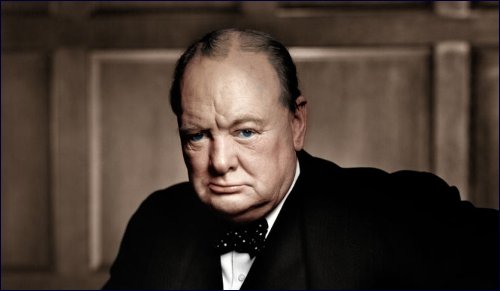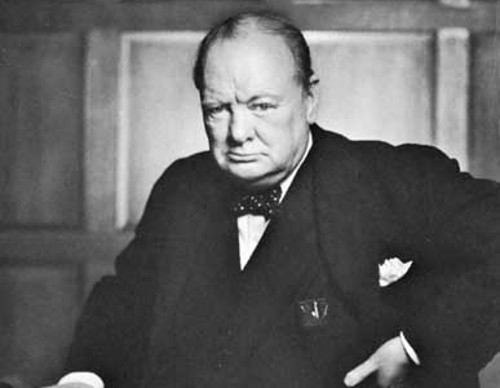 Iran’s Attack on Israel
Iran’s Attack on Israel


6 min read
A new film delves into the pivotal role the great leader played in stopping Hitler.
There is a frightening realization that strikes one who watches The Darkest Hour, the new film about Winston Churchill’s dramatic appointment to become prime minister of England in 1940: there was a chance that Hitler would have succeeded in conquering the world and effectively bringing an end to Western civilization as we know it.
In retrospect we may claim that God would never have allowed it to happen, that the evil which gave birth to the Holocaust would surely not have been permitted to triumph. But history has its share of horrors – and for righteousness to overcome wickedness Jewish tradition states that we cannot simply rely on miracles; history needs heroes for it to bend to the arc of justice.
Jewish faith assures us of God’s concern for our survival. Jewish faith also demands we share with God the responsibility for combating evil and creating the possibility for the fulfillment of Isaiah’s vision of universal peace.
To have been alive in 1941, as I was, was to recognize the immensity of the threat to civilized mankind and the Herculean effort required to halt what appeared to be the unstoppable forces of the Nazi Third Reich. To say the words or even to think the thought that Adolf Hitler might have become a modern-day ruler of the world is to be overcome with the fear of an indescribable nightmare.
 Gary Oldman as Winston Churchill in the film The Darkest Hour
Gary Oldman as Winston Churchill in the film The Darkest Hour
Winston Churchill played a pivotal role in preventing the nightmare from becoming reality and the world from turning into a living version of hell.
The Darkest Hour gives us some of the historical context for the film’s emphasis on the period of May – June 1940. The movie’s historical advisor, Phil Reed, director emeritus of the Churchill War Rooms, and Michael Bishop, Executive Director of International Churchill Society, agreed that “It was the most important moment in Churchill’s life and career and the most important historical turning point of the 20th century. It was really the moment when Hitler could have won the war.”

Churchill turned the tide. The war would drag on until 1945, but Hitler’s path to world domination was stopped. And while historians will continue to deliberate, discuss and dissect the specific ways in which Churchill’s leadership proved to be critical for victory, I would like to single out three major ideas which defined his outlook, altered the course of the war, and continue to serve as a powerful legacy for contemporary leaders as guides for our endangered generation.
Churchill said, “An appeaser is one who feeds a crocodile – hoping it will eat him last.”
On 30 September in 1938, British Prime Minister Neville Chamberlain proudly boasted of his great achievement in signing the Munich agreement:
The settlement of the Czechoslovakian problem, which has now been achieved is, in my view, only the prelude to a larger settlement in which all Europe may find peace. This morning I had another talk with the German Chancellor, Herr Hitler, and here is the paper which bears his name upon it as well as mine. We regard the agreement signed last night and the Anglo-German Naval Agreement as symbolic of the desire of our two peoples never to go to war with one another again…. My good friends, for the second time in our history, a British Prime Minister has returned from Germany bringing peace with honour. I believe it is peace for our time.
Chamberlain’s speech, a pathetic attempt to justify appeasement at all costs and to defend a policy which rewards aggressors while looking away from their victims, is primarily remembered for its ironic value: less than a year after the agreement Hitler's continued aggression and his invasion of Poland was followed by declarations of war on Germany by France and the United Kingdom. Thankfully Chamberlain was succeeded by Churchill – who understood that appeasing those whose seek your destruction makes it easier for them to achieve their goals in the future.
"This is the lesson: never give in, never give in, never, never, never, never – in nothing, great or small, large or petty – never give in except to convictions of honour and good sense. Never yield to force; never yield to the apparently overwhelming might of the enemy.” – Winston Churchill
In perhaps Churchill’s most powerful speech he did not hide from his constituents that in the pursuit of the common goal for England’s peace, security and survival he was offering his people “blood, sweat and tears.” It is a truth which needs always to be reemphasized. Our ideals come with a price, our values at a cost. There will always be threats which seem insurmountable. They need to be countered with convictions of honor and good sense.
Democracy today again faces severe challenges. Israel in particular confronts the age-old hatreds of countless enemies. Remarkably, Churchill chose to emphasize the very message of the forthcoming Hanukkah holiday – never yield to the overwhelming might of the enemy just as the Maccabees proved that “the few can overcome the many”.
“You have enemies? Good. It means you’ve stood up for something, sometime in your life.”
All too often we define ourselves by our friends. Perhaps far more significant is the recognition and acknowledgment of our enemies. America has enemies – because the American way of life esteems democratic values which threaten cultures of discrimination and countries of fascism and dictatorship. Jews have enemies – because anti-Semitism is all too fashionable as scapegoat for political and religious injustices. A life of principle calls for courage to speak out not only for the good but also against the evil, to appreciate your friends but also to condemn your enemies.
On one of Churchill’s last visits to the United States he was asked by a reporter what it was that first led him into politics. Without hesitation came the answer: “Ambition.” “And what, sir,” the reporter continued, “kept you there all these years?” Without a beat Churchill answered “Anger!”
Ambition was certainly an important motivation for Churchill to enter politics. However to endure all the difficulties of leadership, the personal attacks, the demanding decisions, the sleepless nights and the unending stress, there was a more profound motive: anger at those who saw nothing wrong in appeasing the Hitlers of the world instead of opposing them; anger at those who idolized barbarism and idealized racism; anger at the inhuman cruelty and tyranny of Bolshevism and Nazi-ism; and anger at those who felt content to remain mere spectators of history, no matter how criminal its direction, rather than becoming involved in shaping its destiny toward the good and the righteous.
Of course Churchill had his faults. Historians have not overlooked his personal failings. But what makes this film so necessary and the overview of his world outlook so necessary is that it reminds us how much the world today needs leadership – leadership of courage, leadership of strength, and most important of all leadership of wisdom.
